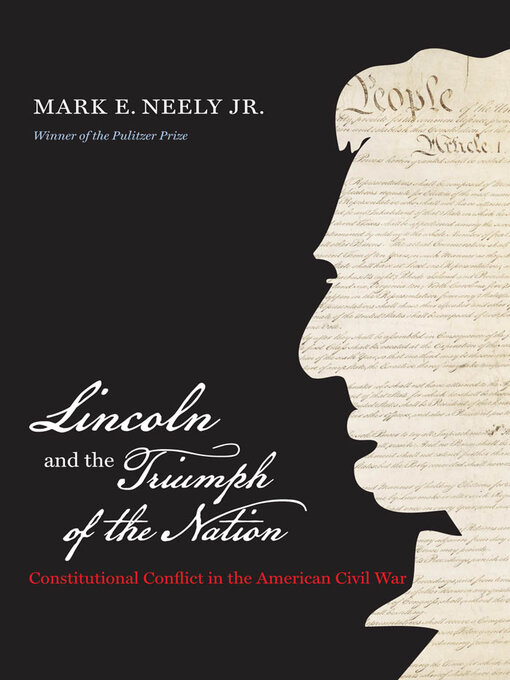- HPU Campus Histories
- Business
- Religion & Spirituality
- Self-Improvement
- History
- See all nonfiction collections
Lincoln and the Triumph of the Nation
Constitutional Conflict in the American Civil War
Previous scholars have examined wartime challenges to civil liberties and questions of presidential power, but Neely argues that the constitutional conflict extended to the largest questions of national existence. Drawing on judicial opinions, presidential state papers, and political pamphlets spiced with the everyday immediacy of the partisan press, Neely reveals how judges, lawyers, editors, politicians, and government officials, both North and South, used their constitutions to fight the war and save, or create, their nation.
Lincoln and the Triumph of the Nation illuminates how the U.S. Constitution not only survived its greatest test but emerged stronger after the war. That this happened at a time when the nation's very existence was threatened, Neely argues, speaks ultimately to the wisdom of the Union leadership, notably President Lincoln and his vision of the American nation.
-
Creators
-
Series
-
Publisher
-
Release date
November 21, 2011 -
Formats
-
Kindle Book
-
OverDrive Read
- ISBN: 9780807869024
-
PDF ebook
- ISBN: 9798893131017
- File size: 2616 KB
-
-
Languages
- English
-
Reviews
-
Publisher's Weekly
January 2, 2012
Bloodier and more destructive than any other American conflict, the Civil War also provoked the nation's severest constitutional crisis. Neely contends in this path-breaking analysis that during the 1860s the constitution was "âtwice tested"âin both the Union and in the Confederacyâsince the combatant polities had adopted more or less identical charters. Revisiting and expanding on many of the questions addressed in his Pulitzer Prize-winning The Fate of Liberty: Abraham Lincoln and Civil Liberties, Neely presents a wide-ranging discussion on federal policy, local activism, legal controversies, and the making of public opinion. Three major issues arise here: the Union's attitudes toward civil liberties, the Confederacy's struggles to overcome state-rights doctrine and create a strong federal power, and the constitutional crisis engendered by the institution of slavery. Of these, the discussion of emancipation is the most significant. Before the war, antislavery advocates had railed against a malignant "Constitutional racism," while finding themselves incapable of stopping it. The Constitution, as ratified in 1787, was powerless to combat slavery as an institution. Rectification of this lacuna required decades of activism, a bloody Civil War, and a series of amendments that would fundamentally rewrite the Constitution, and reimagine the nation as a whole. Neely's argument is much more than a dry recitation of facts; having unearthed numerous anecdotes via scrupulous research, this work is alive with character and narrative. -
Library Journal
January 1, 2015
This account paints a broad canvas regarding constitutional questions on wartime civil liberties, presidential war powers, party politics, emancipation policy, and states' rights. Neely argues that although Lincoln made many missteps in interpreting laws and promoting his policies, constitutional concerns actually strengthened the Union by invigorating political debate.
Copyright 2015 Library Journal, LLC Used with permission.
-
subjects
Languages
- English
Loading
Why is availability limited?
×Availability can change throughout the month based on the library's budget. You can still place a hold on the title, and your hold will be automatically filled as soon as the title is available again.
The Kindle Book format for this title is not supported on:
×- - Kindle 1
- - Kindle 2
- - Kindle DX
- - Kindle Keyboard
- - Kindle 4
- - Kindle Touch
- - Kindle 5
- - Kindle Paperwhite
- - Kindle 7
- - Kindle Voyage
Read-along ebook
×The OverDrive Read format of this ebook has professional narration that plays while you read in your browser. Learn more here.


